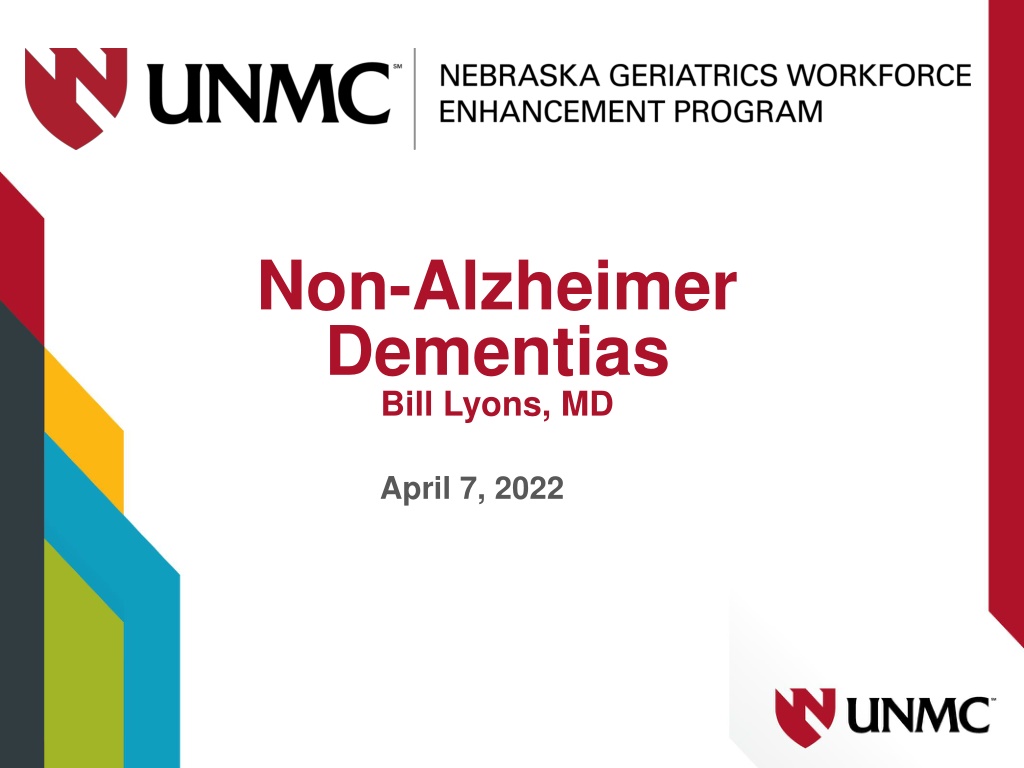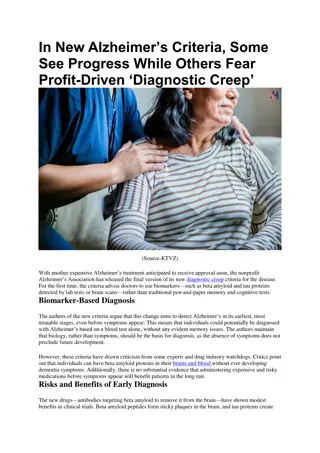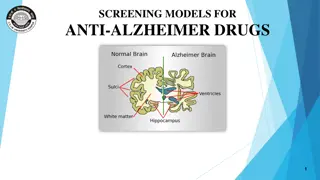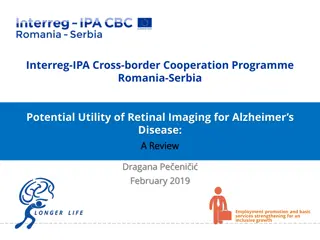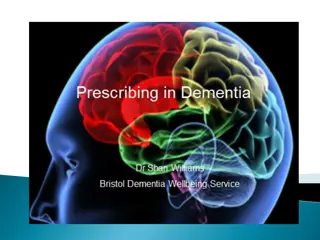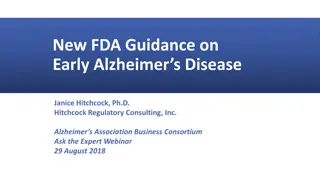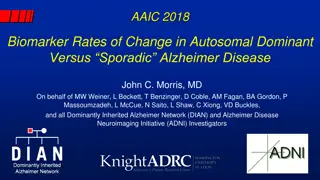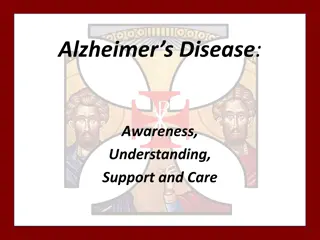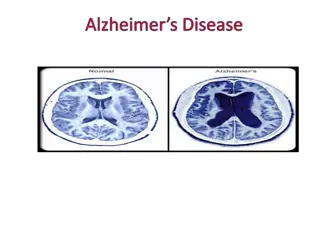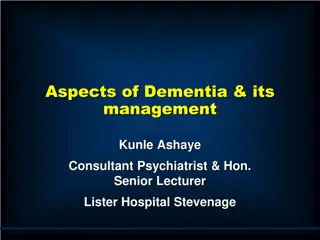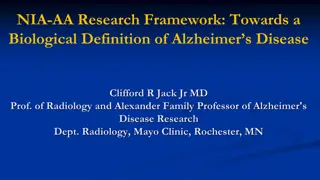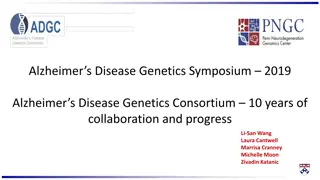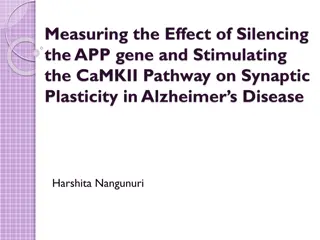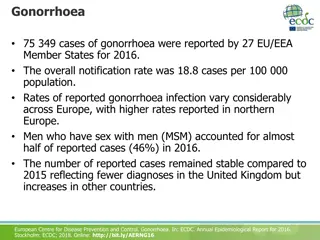Understanding Non-Alzheimer Dementias: Cases and Diagnoses
Explore intriguing clinical cases and differential diagnoses related to non-Alzheimer dementias, including symptoms, evaluations, and potential treatments. From B12 deficiency to vascular dementia, unravel the complexities of cognitive impairments in varied scenarios.
Download Presentation

Please find below an Image/Link to download the presentation.
The content on the website is provided AS IS for your information and personal use only. It may not be sold, licensed, or shared on other websites without obtaining consent from the author. Download presentation by click this link. If you encounter any issues during the download, it is possible that the publisher has removed the file from their server.
E N D
Presentation Transcript
Non-Alzheimer Dementias Bill Lyons, MD April 7, 2022
DSM-5 DEFINITION OF DEMENTIA WHAT IT IS Evidence of significant cognitive impairment Learning/memory, language, executive function, perceptual-motor function . Cognitive deficits must interfere with independence in everyday activities WHAT IT ISN T Developmental delay Delirium Another mental disorder (MDD, schizophrenia, others)
MYSTERY CASE 1 74 yo woman noted by family to forget to pay bills, overwhelmed by familiar recipes, trouble concentrating. Is convinced her daughter in law is stealing jewelry and silverware Sometimes hears voices others don t New clumsy, wide-based gait Anemic: Hb 10.2 with mcv 103
Diagnosis? A. Late onset schizophrenia B. Progressive Supranuclear Palsy C. Vitamin B-12 deficiency D. Lewy Body Dementia
CASE 1: B12 DEFICIENCY Rare cause of reversible dementia Autoimmune (pernicious anemia), pancreatic insufficiency, PPI use, ileal disease (surgery, Crohn s), blind loop syndrome Heme picture can be normal Reduced vibratory sense, reduced proprioception, and psychiatric manifestations common
MYSTERY CASE 2 80 yo man has several weeks of confusion, listlessness, following 2 days of vomiting Has frequent headaches, insists he s weak on one side PMH: ESRD on HD, a-fib (anticoagulated), alcohol use disorder, gait impairment with falls
Diagnosis? A. Delirium B. Chronic Subdural hematoma C. Alcoholic Encephalopathy D. Vascular Dementia
CASE 2: CHRONIC SUBDURAL HEMATOMA Often after minor, even unrecalled, head trauma Onset may be months after the event Risk factors: alcoholism, seizure, anticoagulation, long-term hemodialysis First symptom usually headache, perhaps n/v Confusion/dementia, possible hemiparesis, papilledema, +Babinski
MYSTERY CASE 3 75 yo man, over months, develops slow, wide- based and sticky gait Two MVA s in a month associated with unwise left turns, general obliviousness Wife annoyed by his memory loss, apathy Losing his urine for the first time
Diagnosis? A. Parkinson s Dementia B. Lewy Body Dementia C. Progressive Supranuclear Palsy D. Normal Pressure Hydrocephalus
CASE 3: NPH Famous triad: dementia, gait apraxia, incontinence Idiopathic, or previous meningitis, SAH Initial mental slowness and apathy, later global cognitive dysfunction Aphasia, agnosia usually not seen May benefit from shunting
MYSTERY CASE 4 84 yo woman has to retire from her bakery, as she can t adapt to new equipment, and has lost old sense of organization Has gotten lost driving the 15 blocks from home to work New, severe anxiety Insists neighbor children stopped by to sell Girl Scout cookies PE: +Orthostatic hypotension, +rigidity, poor O/C
Diagnosis? A. Vascular Dementia B. Lewy Body Dementia C. Progressive Supranuclear Palsy D. Parkinson s Dementia
CASE 4: LEWY BODY DISEASE Prominent visuospatial and executive function deficits Cognitive fluctuations common and may be dramatic Parkinsonian deficits usually more symmetric and milder than in PD REM sleep behavior disorder common Poorly tolerate neuroleptics AChEi first-line therapy On average, faster decline than AD
MYSTERY CASE 5 86 yo man noted by his daughter to have declined dramatically over 2 years Christmas 2019: Transient confusion with word- finding problems Summer 2020: New difficulty with familiar devices, loss of interests Fall 2021: Slurred speech, lack of focus, clumsy PMH: Htn, DM2, PAD, tobacco abuse Never good at taking his pills
CASE 5: VASCULAR DEMENTIA Progressive, sometimes stepwise, accumulation of cognitive (and other) deficits from strokes Signs/symptoms depend on stroke locations More vascular risk factors greater risk of VaD Treatment: Vascular risk reduction Maybe AChEi for memory deficits
MYSTERY CASE 6 77 yo woman brought to medical attention by landlord Not paying rent, irritable with neighbors, paranoia, now a shut-in (pre-COVID) PE shows hoarseness, bradycardia, dry skin, ataxia Cognitive testing: VERY slow, impaired memory but other cortical functions ok
CASE 6: HYPOTHYROIDISM Reversible dementia or chronic organic psychosis Possible psychiatric findings: depression, paranoia, VH, AH Possible hearing loss, cerebellar ataxia
MYSTERY CASE 7 60 yo man brought to physician by mortified family Increasingly odd behavior over 1-2 years Keeps bags of maple-nut candy in the car at all times, weight up 50 lbs Last straw -- guest at wedding reception Obnoxious comment to newlyweds Taking food off other guests plates SLUMS 26
CASE 7: BEHAVIORAL VARIANT OF FTD Affects the relatively young: peak incidence 50 s If demented and under 60, FTD and AD about equally common Deficits in social comportment, insight and empathy Disinhibited, impulsive, sometimes ritualistic Or prominent apathy Greater interest in certain foods, sex Memory relatively preserved, not executive fcn ALS association
CASE 7, continued Two types of PPA under FTD umbrella Semantic variant Word-finding deficits (great use of pronouns and circumlocutions) Trouble with object, category knowledge Nonfluent PPA Speech effortful, poor grammar, phonemic mistakes ( slipped on the lice ) Can see apraxia of R-sided limbs
CASE 7, continued Drug treatment for FTD? AChEi may worsen behavioral symptoms Memantine probably ineffective
MYSTERY CASE 8 73 yo man brought to clinic for frequent falls ROS+ for forgetfulness, slowed thinking, apathy and disengagement from family and activities PE findings Soiled shirt front Truncal rigidity in extension Poor postural stability Poor downgaze
CASE 8: PROGRESSIVE SUPRANUCLEAR PALSY Earliest feature typically frequent falling with postural instability Marked akinesia, neck and trunk rigid in extension Supranuclear ophthalmoplegia, especially with downgaze Possible trouble speaking, swallowing, pseudobulbar affect
RAPIDLY PROGRESSIVE DEMENTIA? Decline takes place over weeks to months First considerations: Unreliable history? Unrecognized delirium? Vascular
RAPIDLY PROGRESSIVE DEMENTIA, cont. Consider also Prion disease Infections Neoplasms Corticosteroid-responsive encephalopathy Antibody-mediated paraneoplastic Toxins
RAPIDLY PROGRESSIVE DEMENTIA WORKUP B12, thyroid studies, RPR, HIV, Lyme serology, antithyroglobulin and anti-TPO antibodies, paraneoplastic autoimmune antibodies MRI with contrast and diffusion-weighted imaging CSF: cell count and diff, protein, glucose, electrophoresis for oligoclonal bands, VDRL, PCR for HSV and Zoster EEG
